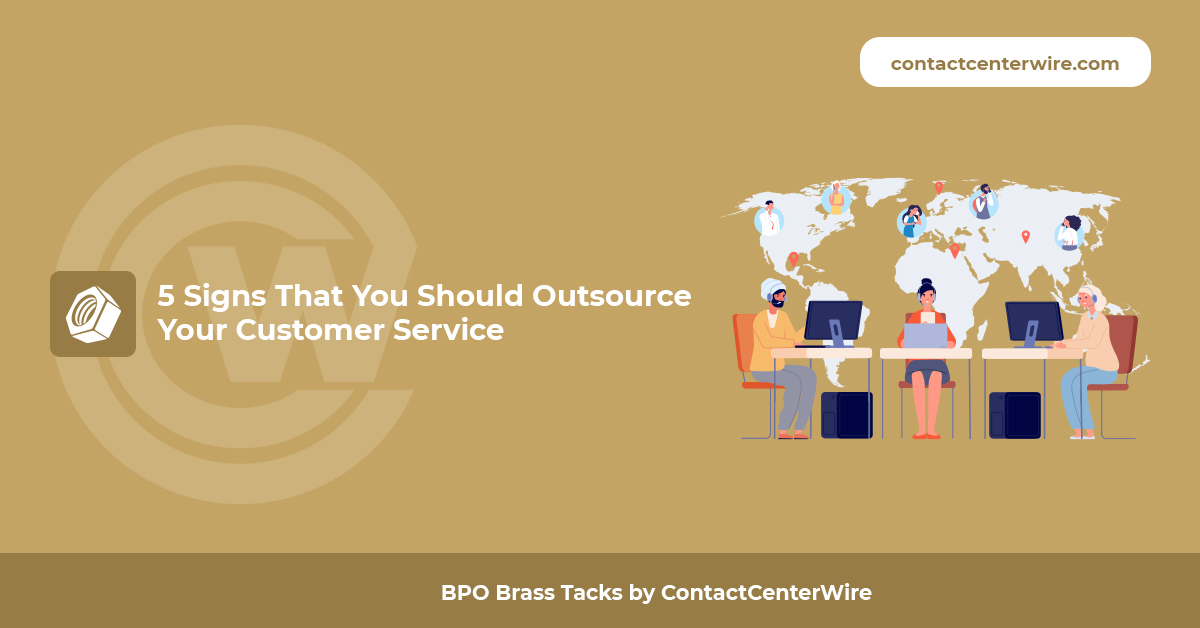BPO Brass Tacks, Ep. 01
Fortunately, sooner or later, a business will reach a stage in its development where the growing interest in your product or service means that you have to answer more and more customer questions, often not just on the phone, but in omnichannel form from email to the message boards of social networking sites. Whether it's running a general information line, providing technical support, taking orders, or dealing with complaints, running a customer service department is essentially a pleasant problem to have because its necessity indicates that there is a demand for what we do. At the same time, we must remember that the staff who communicate with them are the living, breathing shop window for our customers.
The Omnipotent Customer Experience
Customer experience has been one of, if not the most important buzzwords in the service sector for years, and a significant part of that is the direct encounter with the brand, whether it's a phone call, a message answered promptly and in the right style or a high level of assistance. And in this respect, it doesn't matter whether the customer is enquiring about a misplaced e-commerce order, booking a flight, or reporting a malfunctioning charging station for an electric car.
Sloppy customer support, poor information flow, staff who feel overwhelmed and sometimes communicate in an inappropriate style, emails that go unanswered for days or weeks, certainly do not help brand building. Beyond a certain point, the customer does not care if he has not received a satisfactory answer to his questions because of poor work organization, colleagues with other tasks, or even an inadequate technological infrastructure. And negative experiences, as the well-known and presumably true marketing cliché goes, spread seven times as fast as positive impressions.
It is therefore worth thinking about organizing these tasks sooner than later, as professional customer service goes far beyond the use of a few mobile phones and a few skilled communicators.
In-House or BPO?
There are typically two ways to organize the service. The first, obvious method is to set up a dedicated customer service team for this purpose, called an in-house call center. The second is to outsource the service to a third party, which is either called a shared service center or a BPO (business process outsourcing) contact center. And this brings us to the point in the article where it is an excellent opportunity to launch a classic, personal conviction-based, no-holds-barred debate about which is better and why.
We would refrain, mainly because even the cooking of a three Michelin-starred chef is not to everyone's taste if enough people try it or if someone is allergic to one of the ingredients. There are no universal recipes. Rather than sound but sweeping statements, we can at best talk about well- and less well-implemented collaborations and processes.
In some cases, such as in public organizations with extremely high information security and confidentiality, or in areas requiring years of expertise and experience in a particular field, such as an engineering office or a research institute, outsourcing is not practical or even possible. Another issue is that in such specific cases, there is often not enough contact to justify the creation of large customer service. However, once a company has reached the stage of rapid growth, in at least nine cases out of ten, there may be many reasons for setting up an outsourced customer service. And after a somewhat lengthy but necessary introduction, we have finally arrived at the heart of our publication, when we ask the question:
What Are the Signs That You Should Outsource Your Customer Service Tasks?

1. High Volume, but Low Added Value, Administrative Tasks Take Focus Away From Your Core Activities
In a simpler way, when company staff is occupied with additional work phases that are not urgent, perhaps not so important, but necessary, but which prevent them from focusing on the core service.
For example, and without being exhaustive:
- Answering a large number of customer questions
- Providing general information
- Handling complaints
- Technical support, helpdesk operation
- Cold call handling in sales
If you find that a significant proportion of your colleagues' time is taken up by these types of tasks, it is worth considering outsourcing, as these tasks do not require the same level of specialist expertise as those related to manufacturing, service, research, and development.

2. You Have to Handle a Seasonally Varying Volume of Requests
It's not just in tourism or entertainment that colleagues often have to handle up to ten times as many contacts during peak times than on quieter days. If, for example, you run an outdoor entertainment venue or even organize a music festival from year to year, so your business only employs a large staff at certain times of the year, you can easily face the following problems, either separately or simultaneously:
- You have to find other tasks for your customer service colleagues during the off-season
- If you want to keep our already trained, experienced customer service staff, you will have to pay a wage bill for this period as well
- If you want to operate cost-effectively, you have to expect to recruit and train new people for this role at the beginning of the season
A third-party call center is a cost-effective, flexible solution in this case. On-demand services based on actual contact volume are now available from most service providers. As BPO contact centers work for many clients at the same time, often in a shared agent / multi-skill model, they have no problem if the collaboration is only for certain periods of the year, and the previously trained team is available up to six months later, including experience, routine, and knowledge of our brand and activities from previous campaigns.

3. You Want to Boost Your Sales Activity
The human voice is still the most important tool to gain the trust of your customers, so a sympathetic, well-trained operator is guaranteed to be more effective in sales than a lot of impersonal promotional letters deleted without being read. Customer service is an excellent opportunity for inbound sales, to support various upselling and cross-selling activities, as it provides a means of communication with the customer even if they have initially dialed our phone number only because of a faulty appliance or for information about an order. It's no coincidence that most contact centers’ portfolios include sales support as a core service or the delivery of dedicated campaigns.
The most difficult part of the sales process is not the negotiation or the preparation of the quotation, but the preliminary data collection, the interest generation, and the identification of the partners worth contacting out of the thousands of potential customers. Building and cleaning databases, generating leads, sending out general information, communicating seasonal promotions - these are all tasks that do not usually require in-depth technical knowledge of the client's activities, but can be carried out quickly and efficiently even at high volumes with the help of a BPO call center with a sufficiently large team, an up-to-date technological background and operatives who often communicate professionally in several languages. Our own salespeople can then concentrate on the part of the job where their input is essential: detailed needs assessments, negotiations, and the cultivation of old and new partnerships.

4. You Need Multilingual Customer Service
For international companies operating in multiple countries and languages, it is essential to have or use a contact center that is available in your mother tongue. Linguistic and cultural barriers hamper the customer experience. It does no good for any brand if its customer service staff are not fully conversant in the language, trying to keep customers informed of updates on your product or service through poorly written emails riddled with spelling and grammatical errors.
However, creating native, multilingual customer service is extremely expensive and often cumbersome in a traditional brick & mortar system. Why?
- It is much more difficult to find local staff with specific language skills
- As a result, you also face higher labor costs
- There is no guarantee that someone with native language skills will also be a good communicator or that they are a good fit as a customer service agent or telephone salesperson
- If a colleague with specific language skills is unable to work for whatever reason - sickness, holidays, change of job - it is not possible to ensure a high level of customer service on a continuous basis
International BPO contact center companies are able to solve this problem by telecommuting and global sourcing, often operating in a decentralized business model that can integrate customer service professionals working from home, literally anywhere in the world, in accordance with quality and data security standards. Maintenance costs are reduced and the quality of service is maintained at a consistently high level, thanks to a large team of operators in all languages, whatever the industry or activity being supported.

5. Looking for a Cost- And Time-Efficient Customer Service Solution
You can find many pros and cons in professional articles on the effectiveness of outsourced customer services, which deserve a separate article in themselves. One thing is certain: outsourcing to a third party is in many ways more cost-effective and requires less time. Why?
- Because on-demand services tailored to individual needs are now available from virtually every major BPO company.
- Better utilization of working time: operators working on multiple campaigns spend less time idle than staff working on a dedicated helpdesk.
- The time and effort required to manage an outsourced support team is significantly reduced, as operators necessarily have the necessary infrastructure in place, both organisationally and technologically.
- There is no need to organize and set up state-of-the-art technology infrastructure and the IT support to support it, which is a prerequisite for an international service provider.
- The significant added value of outsourcing is that our own tasks become more transparent and our activities more focused: if a team of professionals does everything that we do to the detriment of our core tasks - in simple terms, we don't get bogged down in the minutiae - we have much more time to develop our products and services, to be inspired, to look for innovative solutions, new business opportunities and markets.
Summary
We know that this article only scratches the surface. However, we hope that we have aroused the curiosity of many - we will continue from here next time in BPO Brass Tacks! In the meantime, if you think any of the above statements are true for you and your business, ask for professional advice and a needs assessment from a BPO contact center company! They are usually free of charge and come with no obligation, but they will certainly answer the question of whether you should choose such a solution!

